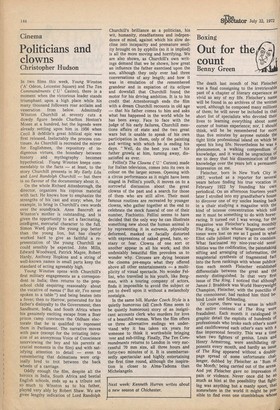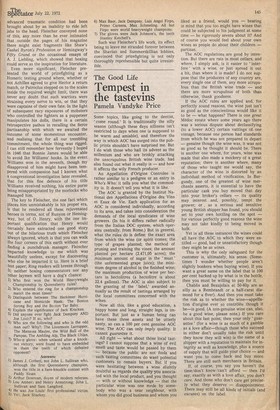Boxing
Out for the count
Benny Green
The death last month of Nat Fleischer was a final consigning to the irretrievable past of a chapter of literary experience as vivid as any of my life. Fleischer's name will be found in no archives of the written word, although he composed many millions of them; he will never be included in that short list of specialists who devoted their lives to learning everything about some corner of human experience; nor, I should think, will he be remembered for more than five minutes by anyone outside the tight little professional island on which he spent his long life. Nevertheless he was a phenomenon, a walking compendium of knowledge, and it would be ungracious of me to deny that his dissemination of this knowledge over the years left a permanent impression on me.
Fleischer, born in New York City in 1887, worked as a reporter for several years before finding his true vocation in February 1922 by founding his own periodical. On an afternoon fourteen years later I strolled into my grandfather's house to discover one of my uncles leaning back in a chair studying a magazine with the kind of intense concentration which told me it must be something to do with horse' racing. It turned out I was wrong, for the magazine was Fleischer's boxing monthlY The Ring, a title whose Wagnerian overtones were lost on me as I gazed in what Eliot calls jubilant rapture at its contents. What fascinated my nine-year-old sensl' bilities was the codification, the painstaking sifting and arranging of information, the magisterial synthesis of fragmented fact into the form rankings with whose publication each month Fleischer established differentials between the great and the merely distinguished. In that very first issue of The Ring, I noticed that although James J. Braddock was World Heavyweight Champion, Fleischer, with the punctilio of the connoisseur, had ranked him third behind Louis and Schmeling. Of course, there was a sense in which the entire contents of The Ring were fraudulent. Each month it catalogued in graphic detail the exploits of hundreds of professionals who broke each other's noses and cauliflowered each other's ears with fine impersonal ferocity. This was a time when two fighters of genius, Louis and Henry Armstrong, were annihilating opponents every month, and hardly an issue of The Ring appeared without a double' page spread of some unfortunate challenger, dubbed by Fleischer as 'Bum of the Month' being carried out of the arena And yet Fleischer gave no impression of pain or violence. Never once did he sn much as hint at the possibility that fighting was anything but a manly sport, that somewhere in the world it might be possible to find even one stumblebum whose
advanced traumatic condition had been brought about by an inability to ride left jabs to the head. Fleischer conveyed none of this, any more than he ever intimated that outside the pages of his magazine there might exist fragments like Shaw's Cashel Byron's. Profession or Hemingway's Fifty Grand or the occasional essays of A. J. Liebling, which showed that boxing could serve as the inspiration for literature.
Even more significant, Fleischer presented the world of prizefighting as a Homeric testing ground where, whether or not Achilles agreed to give Hector a return match, or Patroclus stepped on to the scales inside the required weight limit, there was never any doubt that such warriors were straining every nerve to win, or that they Were captains of their own fate. In the light of subsequent racy exposures of mobsters Who controlled the fighters as a puppeteer manipulates his dolls, there is a certain retrospective pathos in recalling the fierce partisanship with which we awaited the outcome of some momentous encounter, and realising that for all our trembling commitment, the whole thing was rigged. I can still remember how fervently I hoped in 1946 that Ronnie James would be able to avoid Ike Williams' hooks. In the event Williams won in the seventh, though my disapproval of him might have been tempered with compassion had I known what a congressional investigation later revealed, that for this fine defence of his title Williams received nothing, his entire purse being misappropriated by the morlocks who Managed him.
The key to Fleischer, the one fact which Places him unmistakably in his proper era, is that he rendered all these rejuvenated heroes in terms, not of Runyon or HemingWay, but of 0. Henry, with the one important qualification that Henry would certainly have extracted one good story out of the hilarious truth which Fleischer always ignored, which is that you can walk the four corners of this earth without ever finding a punchdrunk manager. Fleischer Imparted knowledge to me which was beautifully useless, except for discovering Who else he imparted it to. Here is a brief test paper; Ring readers will breeze through It; neither boxing commentators nor any Other laymen will have a dog's chance:
1) Who first won the World Heavyweight Championship by Queensberry rules?
2) Who entered the ring for a championship match the most times?
3) Distinguish between The Herkimer Hurricane and Homicide Hank; The Boston Strong Boy and the Boston Tar Baby. 4) Explain the significance of Jack Kracken. 6) Did anyone ever fight Jack Dempsey AND Joe Louis? If so, who?
6) Who are the following and who is the odd man out? Why?: The Livermore Larrupper, The Manassa Mauler, the Wild Bull of the Pampas, The Ambling Alp, The Black Uhlan. 7) Whose gloves when unlaced after a knockout victory, were found to have embedded in them the teeth of which defeated opponent?
Answers:
1) James J. Corbett, not John L. Sullivan who, although the first Queensberry champion, won the title in a bare-knuckle contest with 2) Arthur Donovan, doyen of modern referees. Paddy Sloan. 3) Lou Ambers and Henry Armstrong; John L.
Sullivan and Sam Langford.
4) He was Joe Louis' first professional victim. 6) Yes. Jack Sharkey.
6) Max Baer, Jack Dempsey, Luis Angel Firpo, Primo Camera, Max Schmeling. All but Firpo were world heavyweight champions.
7) The gloves were Jack Johnson's, the teeth Stanley Ketchell's.
Such was Fleischer's life work, its effect being to leave me stranded forever between the Shavian and Summerskillian lobbies, convinced that prizefighting is not only thoroughly reprehensible but quite irresistible.











































 Previous page
Previous page